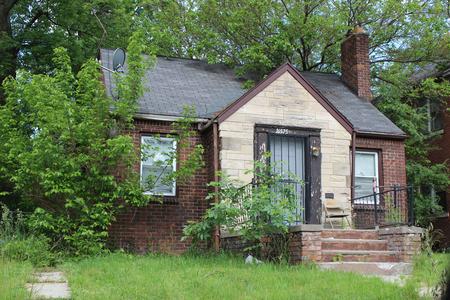Detroit Property Owners Have More Time to Appeal Proposed Assessments [Transcript]
The city extended the deadline from Feb. 15 to Feb. 23.

Detroit residents were supposed to have from Feb.1-15 to appeal proposed assessments, but the city recently extended the deadline to Feb. 23. WDET’s Laura Herberg talked with Alvin Horhn, the City of Detroit’s Deputy Chief Financial Officer/Assessor about the process of appealing proposed property assessments and why the deadline was extended.
WDET: Why has the city extended the deadline for property owners to challenge their proposed 2019 property assessments?
Alvin Horhn: We want to make sure that everyone had every opportunity to do so. There was a slight delay with getting the assessment notices out. Normally, we would like people to get them a week before the review period. But they didn’t start hitting the mail until Saturday, Feb. 2. Once we realized that, we decided to extend the review through February 23.
WDET: What caused the delay?
AH: To be honest with you, the single biggest problem was me. Because the values have increased so much for 2019, I asked my staff to take one last look and review the values to make sure the calculations were correct without realizing that that would delay things a few days. So, on top of that and on top of the weather, it just pushed us back further than I thought it would.
WDET: Can you explain to someone who has never dealt with this before what a proposed property assessment is?
AH: By state law, every single property in the State of Michigan has to be valued by the local assessor. That valuation occurs as of December 31st of the prior year. That requires us to have the assessment notices out by mid-to-late January because Detroit does have a three layer appeals process.
The first layer is the assessor’s review. It starts February 1st. It’s an informal hearing. The property owner or a representative can come into the office, they can call us, they can email us, or they can write a letter explaining that they don’t agree with how the city’s valued their property for the year. It requires the property owner to justify why they feel the property value is too high.

This is an opportunity for the city to start asking questions to make sure that we have our records right. Even though we have every confidence in what we’ve done the last few years – the city just completed a four year, $8 million reappraisal – we understand that something could have been missed. We don’t know what’s going on with every single house in this city. This is an opportunity for property owners to come to us and say, “you missed this,” or “there’s something about my house you don’t know,” or “my neighborhood doesn’t support your proposed values.” It gives us a chance to go out there and take a second look, or a third look, or in some cases, a fourth look.
If we agree with the property owner then we’ll make a change. Sometimes we take what they say. Sometimes we do a counter-offer and they’ll agree with us. Or sometimes, especially in the last couple years, because of the reappraisal, we’ll hold the ground. We’ll say, “We believe our values are right.” That gives the property owner a second shot to appeal to the city’s March Board of Review. It’s a more formal process. The Board of Review is appointed by the Detroit City Council. There are nine members of the Board of Review. They each represent a council member. They hear valuation appeals in the City of Detroit. The property owner can make their argument before the Board of Review. As the assessor, we are required to abide by the decisions of the city’s Board of Review.
If the property owner is happy with the Board of Review’s decision, that ends the process. If they are unhappy, they have one more shot at it: a third level of appeal, and that’s the Michigan Tax Tribunal. That’s a court of law. It’s presided over by a judge. Rules of evidence apply. So, you have to be very sure of yourself if you’re going to go to the Michigan Tax Tribunal. I don’t say that to discourage anyone from taking advantage of their rights of appeal. But, you do have to be quite sure of your position if you’re going to go that far.
WDET: Can you explain why a proposed property assessment is important?
AH: That’s how we determine the market value of properties in the City of Detroit. We’re required to assess every property in this city at the current market conditions. Detroiters saw increases in the market values of their properties. But your taxable value, that’s what your taxes are based on, they’re capped under state law as long as you own your house. So, no one saw an increase of more than 2 percent in their taxable value, as long as they kept their house. It’s important to make sure the assessment is right because if you ever sell your house, then the taxable value is uncapped to whatever the assessment is and then it’s recapped.
So, for example, and this is actually a pretty common scenario in Detroit, if you have an assessed value of $100,000 and you have a taxable value of $20,000 and you sell your house, the year after you sell your house, we’re going to do what’s known as an uncapping. That $20,000 is going to come up to $100,000 and the new owner’s going to be taxed based on that new value. So it’s important that we make sure that every year we get the assessment right.
The assessed value represents the market. So when the assessed values are up, that’s a good thing. If you own your house and see the assessed value rise, it means the market has improved.
WDET: The city has said that assessed values increased for most Detroiters but most Detroiters will not see an increase in their property taxes. But some people will see in an increase in their property taxes. Can you talk about those who will see an increase in their property taxes and what kind of an increase might they see?
AH: For the average tax payer in Detroit it’s going to be less than $100. The only people who will see significant increases are people who bought their property in 2018 because it’s going to uncap for 2019.
WDET: Did any residential property owners see a decrease in their proposed assessed value?
AH: There were several areas of the city which did see a decrease. There are still issues with the housing market in Detroit. Even though overall things are better, there are still some areas in the city which are challenged – nowhere near what it was five years ago, it’s getting smaller and smaller every year – but I wouldn’t fib to you, there are some areas of Detroit which saw a decrease.
WDET: The city has been involved in a four-year reappraisal project. The first two years looked at residential properties. Last year looked at industrial properties. This year looked at commercial properties. Will you remind us why the city went through all these properties and reassessed them?
AH: Well, unfortunately it’s been over 60 years since the City of Detroit had done a complete reappraisal. Because of the issues with the recession, because of the economic difficulties Detroit faced in the late 1990s. early 2000s, the assessed values simply didn’t reflect the market conditions. It got to the point where the State Tax Commission felt they had to intervene. They met with the city. We worked out what’s known as a corrective action plan — which, for all the niceties, was an order from the State Tax Commission to the City of Detroit to fix the issues with assessments. The only way to fix those issues was through reappraisal.

